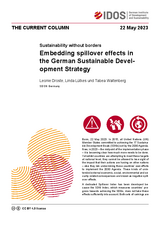Sustainability without borders
Embedding spillover effects in the German Sustainable Development Strategy
Droste, Leonie / Linda Lütkes / Tabea WaltenbergThe Current Column (2023)
Bonn: German Institute of Development and Sustainability (IDOS), The Current Column of 22 May 2023
Bonn, 22 May 2023. In 2015, all United Nations (UN) Member States committed to achieving the 17 Sustainable Development Goals (SDGs) set by the 2030 Agenda. Now, in 2023 – the midpoint of the implementation phase – it is becoming clear how much more needs to be done. Yet whilst countries are attempting to meet these targets at national level, they cannot be allowed to lose sight of the impact that their actions are having on other nations – else they risk undermining these countries’ own efforts to implement the 2030 Agenda. These kinds of unintended external economic, social, environmental and security-related consequences are known as negative spillover effects.
A dedicated Spillover Index has been developed because the SDG Index, which measures countries’ progress towards achieving the SDGs, does not take these effects sufficiently into account. Both sets of rankings are published annually in the Sustainable Development Report. Whilst high-income countries top the SDG Index (with Germany sixth out of 163 in 2022), many countries in the Global South tend to perform poorly in these rankings. In the Spillover Index, by contrast, the opposite is true: this time, it is the high-income countries that fare badly, due not least to unsustainable patterns of production and consumption (with Germany 149th out of 163 in 2022), whilst countries of the Global South lead the field.
Germany’s goal has to be to avoid negative spillover effects in order to work together with other countries to implement the 2030 Agenda at global level rather than hindering these countries’ own efforts. Such spillover effects and the establishment of binding structures must therefore be clearly addressed in the German Sustainable Development Strategy (GSDS) in its role as the country’s national strategy for implementing the 2030 Agenda. Up until now, however, the issue has been ignored. The most recent Voluntary National Review (VNR) submitted by Germany does mention negative spillover effects, the challenges involved in capturing them and the need to reduce them through action at federal government level, thus highlighting the relevance of the issue.
Spillover effects are often wide-ranging and therefore impact on many of the SDGs at the same time. An integrated, cross-cutting approach is thus needed in order to embed measures to prevent negative spillover effects in the GSDS’s existing structure. This can be illustrated by looking at unintended social and environmental impacts along global supply chains. For example, the need for fossil fuels and minerals to power Germany’s transport and mobility sector is producing negative effects in areas where these are mined and processed – areas that are mostly found in countries of the Global South. This is causing environmental damage (SDG 15) such as biodiversity loss and deteriorating soil quality, greenhouse gases (SDG 13), and water contamination (SDG 14).
Tolerating poor working conditions (SDG 8) along supply chains also gives rise to negative social effects such as forced labour, workplace accidents and health damage caused by working in mines without protection. Germany’s demand for and imports of these resources are preventing other countries from achieving many of the SDGs. A suitable starting point for embedding spillover effects into the GSDS would be the six areas of transformation that it identifies – the major shifts that are required if the 2030 Agenda is to be implemented. These areas are: human well-being and capabilities, and social justice; the energy transition and climate action; the circular economy; sustainable building and the transformation of transportation; sustainable agricultural and food systems; and a pollutant-free environment. The areas of transformation highlight the interrelationships that already exist between various SDGs and are creating work structures that straddle the boundaries between government ministries.
Addressing negative spillover effects in the areas of transformation offers an opportunity not only to tackle them as they are at the moment but also to incorporate their ramifications at international level from an early stage, specifically when new processes are being designed. For example, the electrification that is urgently needed in the transport sector will increase demand for raw materials such as lithium and cobalt. If the transformation of transportation is to be made sustainable, therefore, binding structures need to be developed in order to prevent negative effects throughout global resource flows. Working together, solutions need to be devised that take the affected countries’ views into account, and policy coherence needs to be ensured. Besides being covered in the areas of transformation, international responsibility and cooperation would also appear to present a lever that offers a clear route towards this. Pulling this lever has the potential to create a framework that can both smooth and support a transformation.
Seven “transformation teams” have been set up for the six areas of transformation and the aforementioned lever in order to devise specific packages of measures for the various transformations. All these teams – not just the one covering international responsibility and cooperation – should factor negative spillover effects into their work.
It is becoming clear that, firstly, a consistent focus on negative spillover effects across the board will be required in the second half of the implementation phase in order to speed up the transformation and achieve the SDGs on schedule and, secondly, Germany must make the case on the international stage for the prevention of these effects. For this to succeed, they must be embedded in the GSDS and accompanied by legally binding structures.



